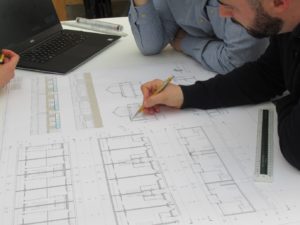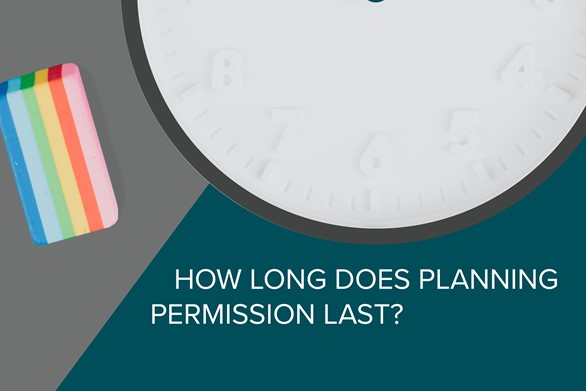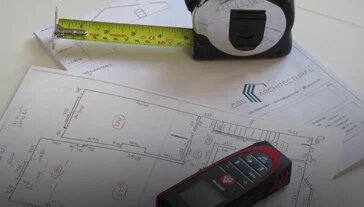How Long Does Planning Permission Last?
How Long Does Planning Permission Last?
If you have planning approval for an extension or other project, or if you have bought a plot of land that has planning permission to build upon it such a new house you probably have a couple of questions on your mind.
You may be thinking one of the following: how long does planning permission last? Is there anything that can be done to stop planning permission from expiring before you are ready to start your project? If your planning permission has run out, have you got to start the whole process again?
Rest assured we get asked these questions all the time and, in this article, we’re going to do what we do best, take the complexity out of these questions and provide simple answers.

How Long Does My Planning Permission Last?
Usually, unless otherwise stated and provided that the plot of land has nothing unusual about it full planning permission is valid for three years from the date that the local authority granted planning permission.
Alternatively, you may have gained outline planning permission, if this is the case you have three years to seek planning permission for the reserved matters.
There are occasions where the this is not the case; however, they are rare and should be clearly stated on your approval letter.
We know what your next question might be…
What Type of Planning Permission Do I Have?
If you were involved in the application you should know which type of permission you have, however if the site or building was bought with planning permission attached to it you may not. We can assist in finding out in any case with a simple planning search.
As suggested in the name, full planning permission covers everything needed from the local authorities’ point of view. Once you have made sure that all conditions have been met or discharged (as outlined within the local authority’s approval letter) and provided all other procedures are in place, you are ready to commence construction work on site.
Outline planning permission is usually attached to larger projects, it covers an approval for the broad idea of a scheme and later a secondary application can be made that covers the finer details or reserved matters.
In both instances you have three years to act on your planning permission to keep it from expiring, but there are actions that can keep it alive.
You may now be thinking…

How Do I Keep My Planning Permission Live?
Before 1968 planning permission had no expiry, once granted you had infinite time to start and complete the work. This led to a large portion of planning permissions failing to be built aa there was not an incentive to take swift action. In 1968 the government brought in a five-year time limit for planning permission, this was then reduced to the current three years in 2009.
The idea behind the change in legislation was to increase the likelihood that if you have planning permission you acted upon it. In the case of full planning permission, you have three years from the date stated on the local authority approval letter to commence the construction work and thus keep it live.
In the case of outline planning permission, you have three years to decide and submit for approval of the finer details or reserved matters, you then have two years from the approval of the final reserved matter to commence the construction work and keep your planning permission live.
But what if you are not ready to start your project…
What Counts as Starting Work for Planning Permission?
This is where things can enter a bit of a grey area. You would assume that you need to commence construction work and keep progressing until the project finished. The reality of this is vastly different, in most cases there needs only be a clear visible attempt of action to keep your planning permission live, the main construction phase need not be started just yet.
As mentioned, this can be a little bit of a grey area and there are numerous court cases that have dealt specifically with this matter, as such we cannot promise that one suggestion will always work. However, can provide guidance on how you can make your planning permission last longer than the initial three years.
A number of actions, usually referred to as ‘material operations’ can be carried out as listed within the amended version of the Town and Country Planning Act 1990 that would constitute the commencement of development on site:
- Any work of construction in the course of the erection of a building;
- Any work of demolition of a building;
- The digging of a trench which is to contain foundations, or part of the foundations, of a building;
- The laying of any underground main or pipe to the foundations, or part of the foundations, of a building or to any such trench;
- Any operation in the course of laying out or constructing a road or part of a road;
- Any change in the use of any land which constitutes material development.
Its easy to see how you can meet one or a number of these conditions without fully committing yourself to the main construction phase. The ‘Digging of a trench which is to contains foundations …’ is a common choice made that is generally accepted by a local authority that construction is underway.
If that sounds too good to be true it may be because it is not without its risks, there are a couple of considerations when opting to start work with a view to only keep your planning permission live.
Whatever work you decide to do needs to be in the accurate position according to the approved scheme. Simply put if you decide to dig a trench for a foundation, the trench needs to be in the correct position for the wall that was on the drawings used to gain the planning permission.
Secondly and potentially a little more problematic is that your works need to more than what would be considered the bare minimum. That is subjective and an officer from the local authority or even the courts in the worst scenario will judge whether you have done enough to constitute ‘material operations.’
There is of course some good news, the courts have stated that the developer or homeowners’ intentions on the works is irrelevant to the above. That means if you are commencing work and intend to continue to the project completion; or if you are only conducting initial operation to stop your planning permission from expiring you have nothing to worry about.
You’ve let your planning permission expire…

Can I Reapply for Planning Permission if it has Expired?
Since 2013 the option of applying to the local authority for renewal has been removed, before then if there were no changes to their planning policies or your site, you could pay a fee to have your planning permission extended. Nowadays we have only the option of stopping it from expiring as discussed above or applying for a new planning permission.
In theory it is not too different from when you applied originally however that is only if your proposed scheme has no major alterations or if the local authority has not changed their specific planning policies.
Before re-applying it is always useful to check the whether the local authority has changed its guidance as a previous approval is no certainty on getting planning permission again, but it should be an advantageous precedent.
It is also handy to have a look at the local authorities recent approved applications, if they are still approving similar schemes your application is likely to be approved, if there are several recent rejections, they may be looking to resist that kind of development. From there you would need to engage a planning consultant and architectural designer to revise your scheme to suit current guidance.
Finding a practise that can handle that entire process for you…
GBS Architectural – How Can We Help You?
The above is a broad outline of a usually complex matter. Whilst the planning procedure is set out by the government through national legislation invariably each local authority administers it in their own unique way.
Whilst we have been able to answer a few key questions about how long planning permission lasts, what type of planning permission you may have, how to keep your planning permission live and what to do if your planning permission has expired. We cannot answer in detail how your specific local authority will take a view on whether you have commenced your project or, if your planning permission has expired how likely you are to get approval again.
For us to give you these sorts of answers all you need to do is send us an email or give us a call and we would be happy to discuss your project with.
GBS Architectural is London based CIAT chartered residential architecture practise with offices in Wimbledon. We specialise in handling the entire architectural process (conception, planning, technical, tendering, contract administration/project management) of all residential projects such as house extensions, loft conversions, outbuilding designs and bespoke residential new-build homes.
We provide a stress-free service that puts out client’s satisfaction at the forefront of our working relationship by acting as a single point of contact for our clients.
If you would like us to help you with a new or existing project, please do get in touch.











0 comments